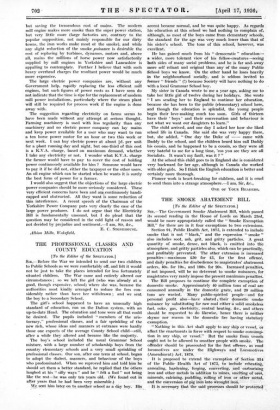THE PROFESSIONAL CLASSES AND COUNTY EDUCATION
[To the Editor of the SPECTATOR.]
SIR,—Before the War we intended to send our two children to Public Schools as we were comfortably off, and felt it would not be just to take the places intended for less fortunately situated children. The War came and entirely altered our circumstances ; so we left the girl (who was already at a good, though expensive, school) where she was, because the authorities most kindly arranged to reduce the fees con- siderably rather than have her withdrawn ; and we sent the boy to a Secondary School.
The girl's school happened to have an unusually high standard of education, run on the Dalton system, with an up-to-date Head. The education and tone were all that could be desired. The pupils included " members of the aris- tocracy," professional classes, and a fair sprinkling of the new rich, whose ideas and manners at entrance were hardly those one expects of the average County School child—still, after a while they altered and became like the majority.
The boy's school included the usual Grammar School mixture, with a large number of scholarship boys from the country elementary schools and a very small sprinkling of professional classes. Our son, after one term at school, began to adopt the dialect, manners, and behaviour of the boys who predominated. When we reproved him and told him he should set them a better standard, he replied that the others laughed at his " silly ways" and he " felt a fool " not being like the rest—he was only ten years old. (We found out in after years that he, had been very miserable.) We sent 4im later on to another school as a day boy. His
accent became normal, and he was quite happy. As regards his education at this school we had nothing to complain of, although, as most of the boys came from elementary schools, the standard for the age was very much lower than that of his sister's school. The tone of this school, however, was excellent.
He has gained much from his " democratic " education- s wider, more tolerant view of his fellow-creatures—seeing both sides of many social problems, and he is far and. away more self reliant and original than any of the many Public School boys we know. On the other hand he loses heavily in the neighbourhood socially, and is seldom invited to former " friends " (!) because Society will have nothing to do with a local Grammar School boy.
My sister in Canada wrote to me a year ago, asking me to take her little girl of twelve during her holidays. She wrote " I am sending her to England to continue her education, because she has been to the public (elementary) school here, and though the education is splendid, the young people begin their love-making much too soon. Girls of thirteen have their ' boys ' and their conversation and behaviour is not what we want our daughters to learn."
The child arrived, and one day I asked her how she liked school life in Canada. She said she was very happy there, but, she added, " One day the Duke of — came with Daddy to the school, and the children heard him call Daddy his cousin, and he happened to be a cousin, so they were all very hateful to me for a long time, 'cos you see they are all Socialists. It wasn't my fault, was it ? "
At the school this child goes to in England she is considered very backward for her age, although in Canada she worked with older girls. So I think the English education is better and certainly more thorough. • Pioneer work is heart-breaking for children, and it is cruel to send them into a strange atmosphere.--I am, Sir, &c., ONE OF YOUR READERS.


























































 Previous page
Previous page